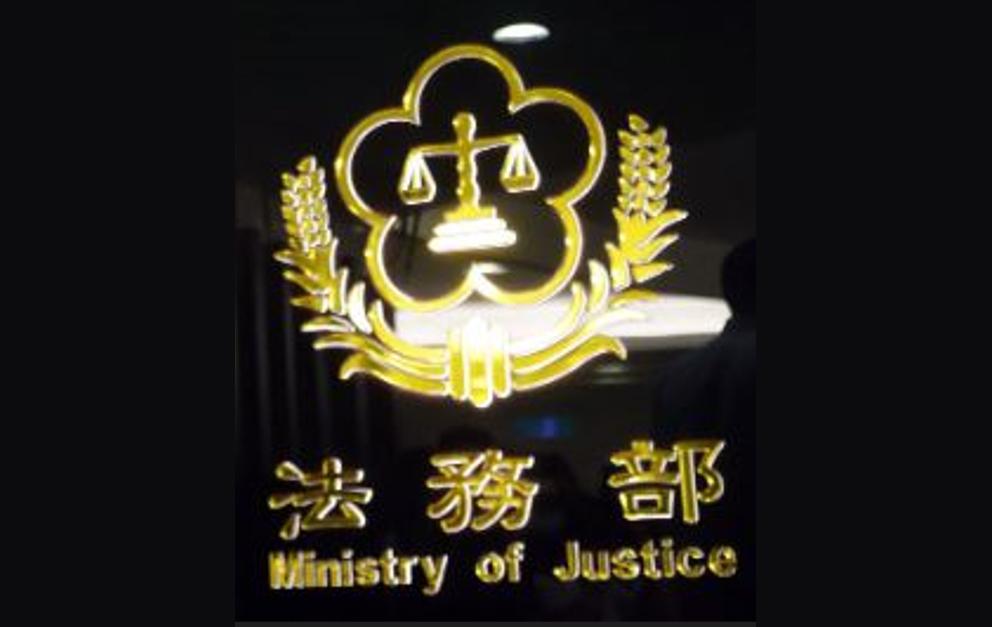Authorities have detained 40 people on charges of interfering with voting rights, the Ministry of Justice said yesterday, adding that nine are suspected of helping a foreign power to meddle in next month’s presidential and legislative elections.
The Supreme Prosecutors’ Office launched an investigation amid a sweep targeting election fraud across the nation, Department of Prosecutorial Affairs official Kuo Yung-fa (郭永發) told a Cabinet meeting in Taipei.
The ministry conducted the operation in collaboration with the Central Election Commission and the Ministry of the Interior, Kuo said.

Photo: CNA
As of Tuesday, prosecutors had issued 15 indictments for alleged election interference and 17 for alleged contraventions of the Anti-Infiltration Act (反滲透法), with nine people named as suspects, a justice ministry report showed.
The indictments might be linked to reports that Beijing organized trips to China for local officials.
Other indictments were issued in two cases of alleged vote-buying, two cases of election-related disinformation, 37 cases of illicit foreign campaign financing and eight cases of gambling on vote outcomes, the report said, adding that NT$27.5 million (US$877,753) had been confiscated in the gambling cases.
Prosecutors have also detained 35 people and confiscated NT$2.35 million and a NT$3.5 million car in an alleged case of cash for petition signatures, the report said.
The act forbids conducting electoral activities on behalf of a hostile foreign power, Deputy Minister of Justice Huang Mou-hsin (黃謀信) told a news conference following the Cabinet meeting.
The law also mandates enhanced sentencing for breaking election laws if they are for a foreign power, Huang said.
In other news, a report by cyberintelligence company Graphika said that an online public opinion manipulation scheme favored the Chinese Nationalist Party (KMT).
Graphika said in the report published yesterday that it detected “a sustained and coordinated effort to manipulate online conversations about Taiwanese politics” that began as early as May last year.
The team did not attribute the campaign to a specific actor, but the tactics, techniques and procedures used were characteristic of an online influence operation, it said.
The operation used more than 800 Facebook accounts, 13 Facebook groups, one YouTube channel and one TikTok account to spread political memes and videos targeting the Democratic Progressive Party’s (DPP) presidential candidate, Vice President William Lai (賴清德), and others, it said.
The operation revolved around material generated by an online persona called “Agitate Taiwan” (鼓動台灣) on TikTok and a now-defunct YouTube channel, it said.
The inauthentic accounts used stolen or digitally manipulated images in their profiles, generated content with nearly the same timestamp, it said, adding that metadata showed their TikTok links were generated during a single browser session.
Additionally, several of the Facebook accounts posted check-ins at identical coordinates in Taichung, Graphika said.
The operation generated and amplified content that focused on debunked allegations that children were drugged at a kindergarten, reports of egg shortages and compaints about Medigen’s COVID-19 vaccines in a bid to depict the DPP as corrupt or incompetent, it said.
However, authentic engagement with the content was scant, it added.
Additional reporting by Chung Li-hua

CHAOS: Iranians took to the streets playing celebratory music after reports of Khamenei’s death on Saturday, while mourners also gathered in Tehran yesterday Iranian Supreme Leader Ayatollah Ali Khamenei was killed in a major attack on Iran launched by Israel and the US, throwing the future of the Islamic republic into doubt and raising the risk of regional instability. Iranian state television and the state-run IRNA news agency announced the 86-year-old’s death early yesterday. US President Donald Trump said it gave Iranians their “greatest chance” to “take back” their country. The announcements came after a joint US and Israeli aerial bombardment that targeted Iranian military and governmental sites. Trump said the “heavy and pinpoint bombing” would continue through the week or as long

TRUST: The KMT said it respected the US’ timing and considerations, and hoped it would continue to honor its commitments to helping Taiwan bolster its defenses and deterrence US President Donald Trump is delaying a multibillion-dollar arms sale to Taiwan to ensure his visit to Beijing is successful, a New York Times report said. The weapons sales package has stalled in the US Department of State, the report said, citing US officials it did not identify. The White House has told agencies not to push forward ahead of Trump’s meeting with Chinese President Xi Jinping (習近平), it said. The two last month held a phone call to discuss trade and geopolitical flashpoints ahead of the summit. Xi raised the Taiwan issue and urged the US to handle arms sales to

BIG SPENDERS: Foreign investors bought the most Taiwan equities since 2005, signaling confidence that an AI boom would continue to benefit chipmakers Taiwan Semiconductor Manufacturing Co’s (TSMC, 台積電) market capitalization swelled to US$2 trillion for the first time following a 4.25 percent rally in its American depositary receipts (ADR) overnight, putting the world’s biggest contract chipmaker sixth on the list of the world’s biggest companies by market capitalization, just behind Amazon.com Inc. The site CompaniesMarketcap.com ranked TSMC ahead of Saudi Aramco and Meta Platforms Inc. The Taiwanese company’s ADRs on Tuesday surged to US$385.75 on the New York Stock Exchange, as strong demand for artificial intelligence (AI) applications led to chip supply constraints and boost revenue growth to record-breaking levels. Each TSMC ADR represents

Pro-democracy media tycoon Jimmy Lai’s (黎智英) fraud conviction and prison sentence were yesterday overturned by a Hong Kong court, in a surprise legal decision that comes soon after Lai was jailed for 20 years on a separate national security charge. Judges Jeremy Poon (潘兆初), Anthea Pang (彭寶琴) and Derek Pang (彭偉昌) said in the judgement that they allowed the appeal from Lai, and another defendant in the case, to proceed, as a lower court judge had “erred.” “The Court of Appeal gave them leave to appeal against their conviction, allowed their appeals, quashed the convictions and set aside the sentences,” the judges